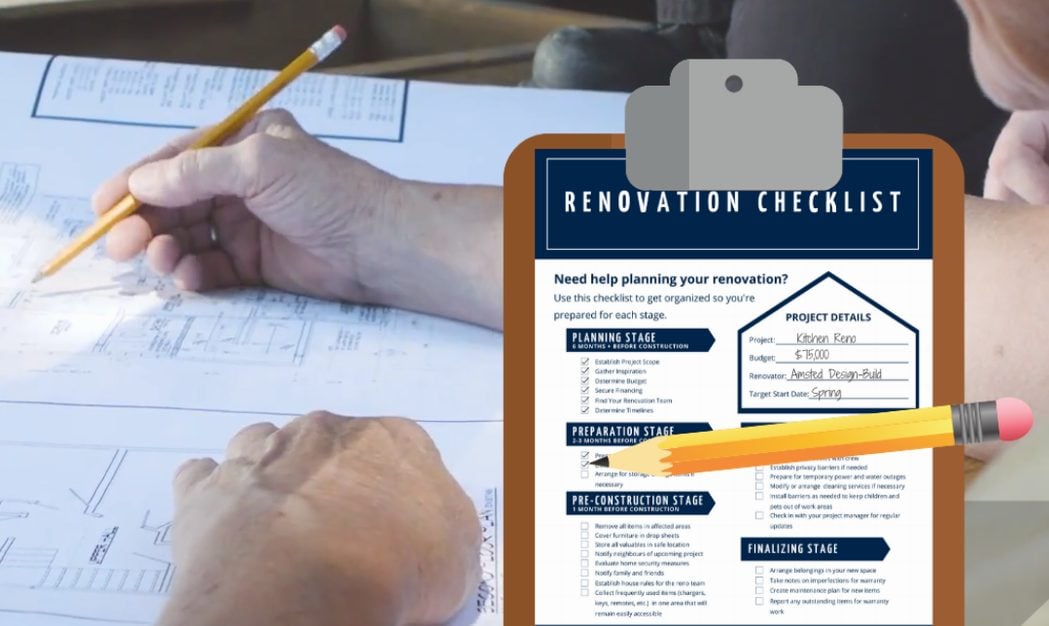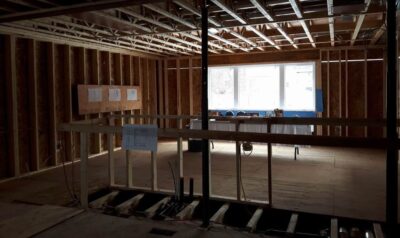You’ve been thinking about the projects that will turn your house into your dream home, but are you actually ready to get started? How do you ensure your project goes smoothly and doesn’t turn into a nightmare? With a renovation checklist.
A renovation checklist helps you and your family get ready. It provides you with an overview of what you should expect in the months leading up to, during, and after a renovation project, so you will know exactly what you need to do.
The steps involved in getting your family ready to take on a significant project are just as important as the plans for the project itself. A renovation is a major disruption in your family’s routine and life. The best way to ensure a successful and rewarding project is to plan, prepare, and set reasonable expectations.
If you’re working with a good company, they’ll do their part to make sure you’re informed of all the steps involved in your renovation, but it’s up to you to take that information and form your family’s plan. Think of it as the blueprint for your family’s life for the duration of your project.
Planning stage (6 months+ before construction)

Establish your project scope: The first thing you need to determine, well before any work begins, is exactly what you want to accomplish with your renovation. This is known as the “scope of the project”.
Figure out what works in your space, what doesn’t work, what is an absolute must, and what could be left for a future project based on your budget. Write all of this down. It’s an important part of your renovation checklist. It acts as your wish list and what you will eventually review with your designers, but right now will help you prepare the next steps.
Gather inspiration: As you identify your scope of work and what your project will include, you should start looking for inspirational photos and examples of things you like, as well as things you don’t like. Knowing what you like vs. what you don’t like gives your designer more direction and ensures they will be able to create the perfect space for you.
Determine your budget: Once you know your project scope, you can determine whether you have the budget for it. Think realistically about what you’re willing to spend, and don’t forget to consider your scope of work.
Also, it’s advised to have a contingency fund of approximately 10 per cent of your budget for any unexpected surprises that might come up during construction.
Determine your team: Thoroughly research and interview renovation professionals to determine who you want to work with. Good renovators are booked up well in advance, which means you should find and book your team well before you want your project done.
It’s important not to rush through this stage. You need to feel you can trust your renovator, which means taking the time to check them out by reading reviews, looking at past projects, and asking questions.
Establish a timeline: Once you’ve selected your team and booked your renovation, you need to discuss when certain elements will take place. For example, you’ll need to make time for measurements or in-house consultations. Also, depending on the type of renovation, there may be materials that need to be stored on site.
Work with your renovation team to confirm everything — even if it’s not for several months — so there are no surprises when the time comes to start your project.
Preparation stage (about 2-3 months before project begins)

Prepare your kids: All children react differently to the disruption of a home renovation project; it’s not always easy to predict whether it’ll be a positive or negative reaction.
Younger kids are rarely blasé about seeing construction equipment tearing into their backyard or workmen ripping down walls. Some children find the process upsetting because they feel their world is changing around them.
Others are so caught up in the thrill of the activity that little else matters to them. In any case, talk to your children before the project starts, describing the process in general, and stressing that this is all about a positive eventual outcome — a new pool, an addition, a larger living room, new floors — and not about destruction.
Living arrangements: If you’re doing a large project, it may be recommended that you don’t stay in your home while the work is being completed. In that case, you need to sort out your living arrangements in advance so you have time to find a viable option.
If you would rather remain in your home, discuss with your reno team where your family can set up “safe zones” throughout the different stages of the project.
Make sure to consider your pets as well. Even if you’re staying in the home, your pets may become stressed with significant noise disruptions. You may want to set up a safe place away from the noise they can go to if they are overwhelmed.
Storage arrangements: If you’re going to be completing a larger project, you may find it beneficial to put your furniture or other belongings into storage. It will protect them from the dust and debris, while also giving your construction team more space to work.
Pre-construction stage (about 1 month to 1 week before)
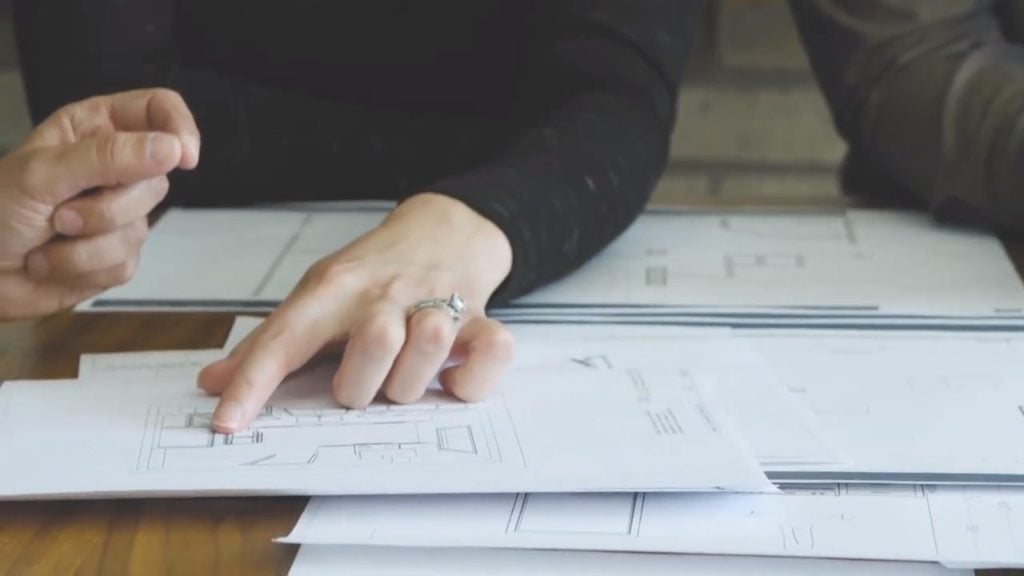
Clean everything out: Remove everything from the space being renovated. That includes furniture, decor, accessories, artwork, etc. If you can’t move furniture on your own, ask your renovation team to help you with it.
Your renovation checklist includes wrapping your furniture in plastic drop sheets to protect pieces from rips, dust and stains. Smaller items should be put away in bins and boxes in another part of your home.
Remove all items from shelving units in rooms adjacent to the reno and cover furniture. Take photos and other decor off the walls as well. This is a preventative measure to protect them. A spare room is a great place to store all removed items.
Remove valuables. Whether located in the work area or not, any items of monetary value — jewelry, cash, precious metals, even some prescription drugs — should be removed from your home and placed in a safe deposit box.
If you have a home safe, store them there. You don’t want to play the blame game with your contractor or their workers, especially if it turns out your child misplaced something.
Get your most important stuff together. Once work begins, it can suddenly seem impossible to find anything. Get it together now and put it all in one place well away from the work zone.
If you won’t be using your regular entryway, set up a temporary command centre elsewhere with room for mobile phones, chargers, keys, mail and other essentials.
House rules: Determine the “rules of the house” for the work crew. For instance, what access will you give them to bathrooms and eating areas, if any? What parts of your home will be off limits? If there are rooms you want off limits you should establish that with the team from the start.
Contractors will usually order up portable toilets for large-scale projects (like building an addition), but in most other remodeling projects, there will be no toilet. It is your decision whether to allow workers to use yours.
If you have a guest bathroom or powder room, it will be to your advantage to “sacrifice it” to the workers during the course of the project.
Tip: Replace towels with a roll or two of paper towels on the sink for workers to use to prevent stains.
Be a good neighbour: If you live in a single-family detached home, you probably are not legally obligated to seek approval from your neighbours for your project. Remodeling projects that touch the property line, like fences, are an exception.
If you live in a condominium, your renovation checklist may include seeking approval from the board for remodeling projects within your walls. It is almost certain that you will need approval for projects that involve common (shared) walls or your home’s own interior walls. (If that’s the case, you’ll need to get this permission well in advance.)
As a goodwill gesture, though, you should talk to your adjacent neighbours, informing them of your upcoming plans.
Home security: Having lots of people coming and going can leave your home more vulnerable to theft; not necessarily from your construction team, but from opportunists who notice there is work going on at your house.
Consider adding a programmable lock to your front door that allows access to your renovation team while the work is being done but that you can reprogram afterwards. (Some smart-phone-controlled locks now allow you to monitor who is in your house and when.)
Reno-free zone: Designate a renovation-free zone for your family to gather in semi-relaxation. Make sure you have everything you need in one place, such as a kettle or microwave, so you have one functional space to gather, eat or just unwind at the end of the day.
Friends & family: During a long renovation, there may be times when you need to lean on others — for a place to spend the night, do a load of laundry, have a shower, or just get some moral support. Give your close friends, family, and neighbours plenty of notice that you are starting a renovation project and they will likely be happy to help if you need something down the road.
Construction stage: part of your renovation checklist
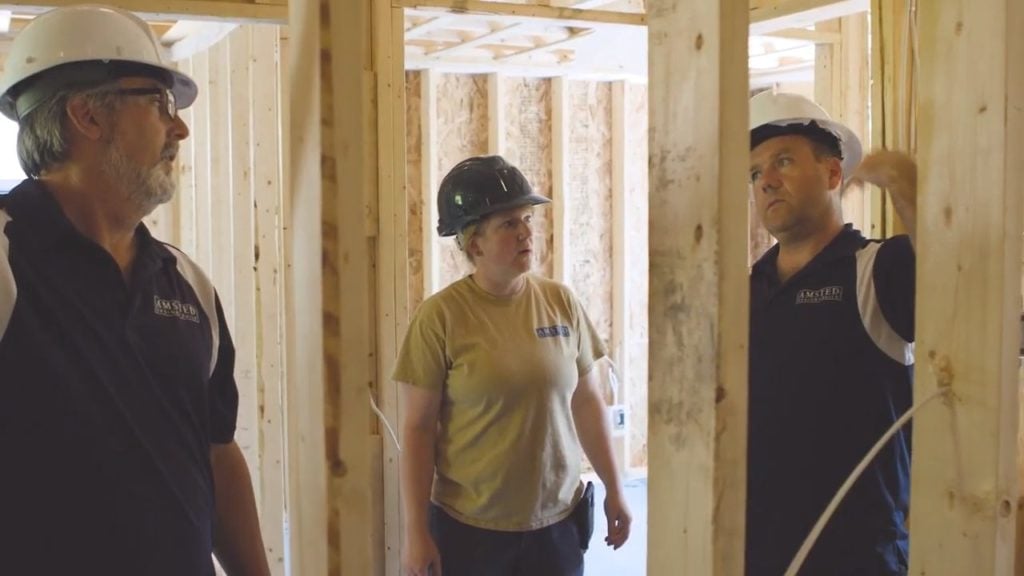
Schedules: Make sure to talk in detail about what the construction schedule will be like. If you work from home, you may want to work somewhere else for part of the reno, or all of it depending on what is being done.
If workers are on site until 3:30, but your kids are home from school at 3 p.m., see that they have somewhere to go or that you are there to greet them and ensure they don’t run into the construction zone.
Privacy: Think about what time you usually shower and get ready for your day. Will the workers already be in your home at that time? If you’d like to be able to walk through the house in your PJs without running into your contractor, consider putting up opaque room dividers between the work areas and your private zones.
If you’d like to have your coffee in peace in the morning, consider setting up a coffee-making station in your bedroom (unless, of course, that’s one of the rooms being renovated!). Shift your schedule, move your stuff, do whatever you need to do now and you will feel less hassled when the work begins.
Construction disruption: Be ready for temporary hook-ups for water and electricity, as well as make-shift cooking and washing stations if your kitchen and/or bathrooms are being remodelled, and day-time construction noise. But even with temporary hook-ups, there may be times when there are power or water outages.
Pet & child barriers: If you have a bird or hamster, etc., in a cage in the room that is going to be renovated, relocate it to another room or bring it to a sitter. Kids, cats, and dogs should be kept away from the reno area at all times, even at night when no one is around as there could be harmful material that they may ingest.
That may mean getting barriers to keep them out of areas they shouldn’t be. Also, workers should not be asked to watch your pets while they are working in your home and you are at work.
Cleaning: Hopefully, daily clean-up is part of the service your renovator provides, meaning they will always leave a clean work site at the end of each day. But be sure to discuss your expectations with the team.
No matter how thorough they are in protecting your home, construction is a messy job with dust and debris finding its way into non-construction areas. If you use a cleaning service, consider more frequent visits during the construction period.
Finalizing stage
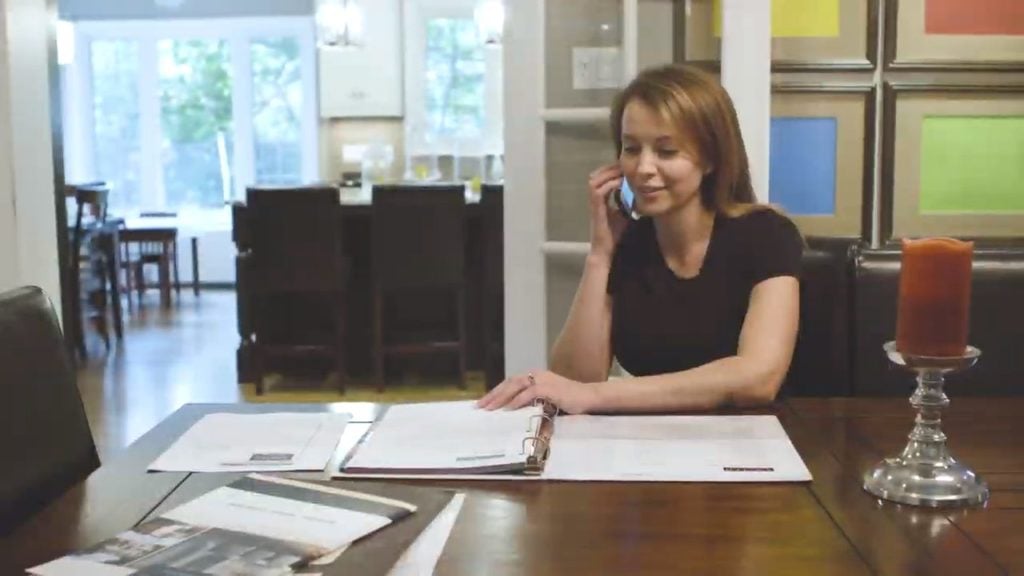
Get organized: When your renovation is complete, it’s time to return home! Take your time moving everything back in so you can organize it all into the best spaces. Even when you’re thrilled with how your project turned out, having your usual routine flipped around takes some getting used to.
Take notes: Take note of any imperfections or issues you see. Your renovation should come with a warranty, so it’s important to keep a list so you’re ready when the time comes to have someone come fix them.
Maintenance: Your new renovation may have come with some new finishes or materials you aren’t familiar with. Make sure you find out the best way to maintain your new items to keep them looking new for years to come.
One final note…
A major home remodeling job will put significant strain on your relationship. If you go into it knowing this, you are already off to a good start.
A remodeling project is a perfect storm where many factors clash: huge cash outlay, mess, diminished privacy. Protect your relationship by keeping the lines of communication open but giving each other ample breathing room when needed.
Once all of this is done, you’ll be ready to go and prepared for a successful renovation.
